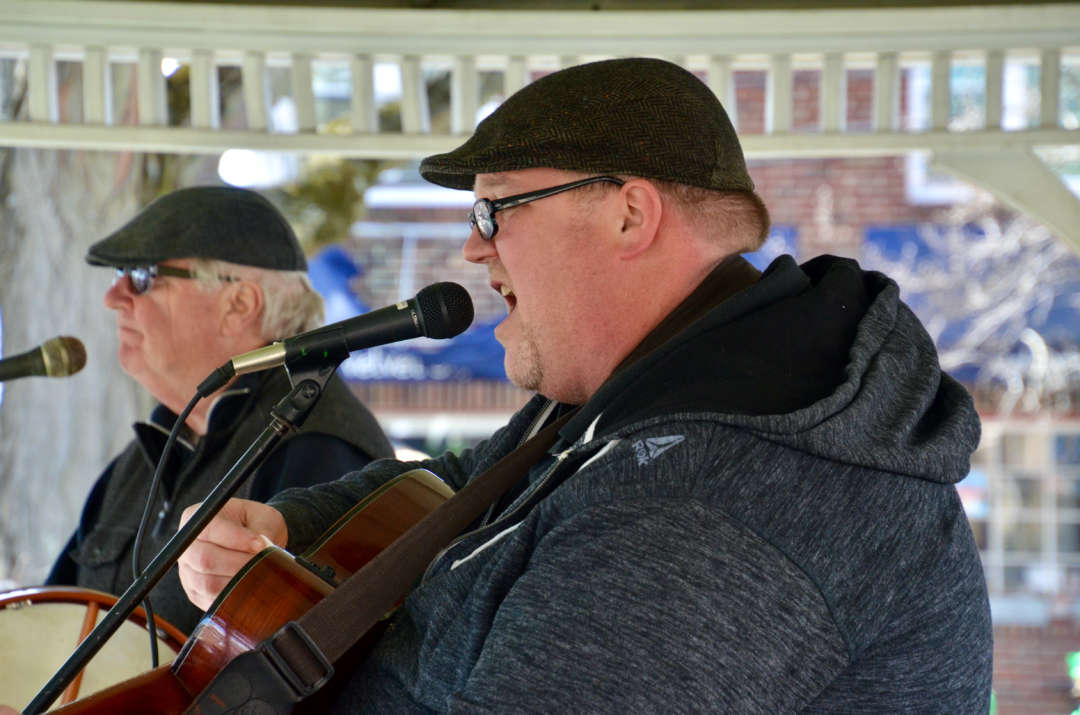It’s where to go when Derek Warfield & The Young Wolfe Tones host a live online concert, where local Irish musicians publicize upcoming gigs—or post their availability for new ones—and where you can hear a vintage recording of the Chieftains playing “The Foggy Dew.”
And a whole lot more.
It’s The Great Irish Songbook, a group page on Facebook, and if you want to join in the fun, you can.
The page is the brainchild of Bill Donahue, Jr., front man for The Shantys—and who better? He’s been playing Irish music since 1999. He grew up in a household heavily influenced by the musical preferences of his Derry-born grandfather and his mother, from Dublin. He’s been hearing rebel tunes practically from the cradle.
He’s been a musician since 1999, starting in a Pogues cover band. At an early age, he started taking tin whistle lessons. They didn’t take at the time—he wasn’t very good at it, he admits—but later on in life he picked it up again, and now it’s one of his principal musical instruments.
Donahue launched The Great Irish Songbook on March 19, 2014, right after St. Patrick’s Day, “probably because I had played a lot of gigs up to that,” he says. “I had a day or two off after St. Patrick’s Day, and I said, what would have been really nice would have been if I’d had a forum to push out not just my gigs, but all the rest of the Irish musicians, especially in and around Philadelphia. So that’s basically where it came from.”
Today, it looks like Donahue has gotten his wish. The Great Irish Songbook has 1,500 members from all around the world.
“It’s just been slowly building,” he explains. As a kid, he says, “I spent a lot of summers in the Catskills, and there’s a very heavy Irish influence up there, so I know a lot of New York people as well on Facebook. So I think that between Philadelphia and New York, that’s where most of our community comes from. Some of it is by word of mouth. Some is just friends of friends. And sometimes I’ll add a new Irish musician from a different area. The next thing you know, there are friends of that person who are friends with that person who invite 25 more people. I have a lot of musicians and friends who tell me it’s their favorite group on Facebook.”
So clearly, The Great Irish Songbook has universal appeal. But for Donahue, an emergency department nurse manager for Temple’s Jeanes Hospital campus—a serious point of pride, especially having watched his team grow and develop during the Covid crisis—most of his connections are local. The Philadelphia Irish music scene is robust, he says, and all the musicians know, like and support one another.
“There’s really no animosity between any of us,” he says. “We all look out for each other. We try to get each other gigs. If one of us can’t do it, we call the next person and ask them if they can do the gig. We hang out together. We love when we play festivals together. We’re really tight-knit. I encourage them all to put their gigs on the Songbook.”
This camaraderie came into play during the Covid crisis, when so many full-time Irish musicians fell on tough times. All their live gigs dried up almost instantly. In this respect, Donahue says, the Great Irish Songbook might have been a lifesaver for some of them as they moved on to produce live streaming concerts, taking tips via Venmo and PayPal.
One of the great advantages of live streaming, Donahue says, is that many of those musicians found new, much broader audiences—more than they would have gotten playing at local pubs and clubs.
“Obviously, the whole world has changed with Covid,” he says. “Now, there are many more live online gigs than there used to be. There was no income source, otherwise. They couldn’t play at a bar. They couldn’t play at festivals. So the live gigs really helped. And it’s kind of expanded their horizons a bit.”
Donahue, who posts his own musical content on the page, has also found a new audience. For example, he says, “I have cousins in Dublin. Even though they’re five hours ahead, they could still watch me. It’s been amazing. It’s really made the world a little smaller and opened up things.”
As with other Facebook groups, Donahue is not alone in posting content. The site has grown to the point where other musicians and Facebook friends publish their own posts. And that, he says, is exactly what you want in an engaged Facebook group.
Donahue makes no money from his Facebook enterprise. He does it just for the love of Irish music, and those who play it. “That’s what I’m all about,” he says. “It’s my passion. That’s why I created the page, and why it’s still running to this day.”

